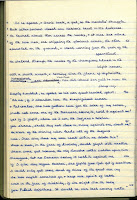 Richmond Lattimore '26 is widely regarded as one of the best
modern translators of ancient Greek texts. For example, his 1952 translation of
the Iliad is excellent and praised by
his fellow classicists. Rauner Special Collections Library possesses a large
amount of material relevant to Lattimore, ranging from poems he wrote as an
undergraduate about sunny Hanover afternoons to his personal correspondence
with friends.
Richmond Lattimore '26 is widely regarded as one of the best
modern translators of ancient Greek texts. For example, his 1952 translation of
the Iliad is excellent and praised by
his fellow classicists. Rauner Special Collections Library possesses a large
amount of material relevant to Lattimore, ranging from poems he wrote as an
undergraduate about sunny Hanover afternoons to his personal correspondence
with friends.

Among these materials is a notebook he kept while translating the Iliad, conveying something of the method of his translational process. The notebook, covering Books 15 to 22 of the Iliad, contains little in the way of editing marks and closely resembles the finished, published translation, which is itself quirky. One example of this quirkiness is that it capitalizes "God," doing so ten times. Out of five other famous Iliad translations (Fagles, Lombardo, Fitzgerald, Merrill, Mitchell) there is no precedent for this decision. Interestingly, the notebook at Rauner indicates Lattimore’s initial uncertainty regarding the capitalized "God" in two different places, 15.403 and 17.101, images of which are shown here.
 For those unfamiliar with or rusty on the Iliad, the speakers of these two
passages are, respectively, Patrokolos and Menelaos. Patrokolos (a Greek)
speaks of his desire to bring Achilleus back into the fighting, and Menelaos
(also a Greek) contemplates the consequences of yielding before Hektor, the
mightiest Trojan warrior. Plot details aside, the strikethrough as seen in the first notebook image (Lattimore's
own) conveys his somewhat intensive deliberation regarding phrasing, the
subject of the sentence, and the capitalization of "God." As is evident, he does not capitalize the first instance of the word in his notebook,
yet does so with the later Menelaos passage, shown here in the next image. In the published version of his
translation, both instances are
capitalized. So, the issue of capitalization in the notebooks, later resolved
in published format, reveals Lattimore’s initial trepidation regarding whether
to capitalize "God."
For those unfamiliar with or rusty on the Iliad, the speakers of these two
passages are, respectively, Patrokolos and Menelaos. Patrokolos (a Greek)
speaks of his desire to bring Achilleus back into the fighting, and Menelaos
(also a Greek) contemplates the consequences of yielding before Hektor, the
mightiest Trojan warrior. Plot details aside, the strikethrough as seen in the first notebook image (Lattimore's
own) conveys his somewhat intensive deliberation regarding phrasing, the
subject of the sentence, and the capitalization of "God." As is evident, he does not capitalize the first instance of the word in his notebook,
yet does so with the later Menelaos passage, shown here in the next image. In the published version of his
translation, both instances are
capitalized. So, the issue of capitalization in the notebooks, later resolved
in published format, reveals Lattimore’s initial trepidation regarding whether
to capitalize "God."
A letter addressed to Lattimore and archived in Rauner provides some valuable context for his deliberation over the unique capitalization of the word "God." Dated June 27, 1933, the letter’s author
 was Richard
Jackson, a friend of Lattimore's from Dartmouth who graduated Phi Beta Kappa
with a degree in Classics. The body of the letter is a speech that Jackson
produced at Lattimore's request. The speech is somewhat discursive but
discusses the importance of poetry and religion:
was Richard
Jackson, a friend of Lattimore's from Dartmouth who graduated Phi Beta Kappa
with a degree in Classics. The body of the letter is a speech that Jackson
produced at Lattimore's request. The speech is somewhat discursive but
discusses the importance of poetry and religion:"Everywhere in epics and lyrics... is the poetry of religion. Religion, I realize, is a hazardous subject to discuss these days.... We should not lose sight of the immaterial idea.... Nay, we must believe in that idea, not through logic, but through poetry...."
The comment about religion being "hazardous" might explain Lattimore’s timidity. More importantly, the letter enshrines a moment when Lattimore apparently sympathized (by requesting the speech from Jackson) with the desire to believe in that "immaterial idea… through poetry." Moreover, the mention of "epics and lyrics" in the letter brings to mind the Iliad. This letter potentiates a Christian subtext to the capitalized "God" of Lattimore's translation, a potentially dangerous move for one who wished to have a reputation as a serious scholar of Greek literature.
To examine Richmond Lattimore's notebooks and correspondence in greater detail, ask for MS-503 at Rauner Library.
Posted for Henry Woram '17, CLST 4 class
I appreciate this article. I also love the photo of Dick. Very handsome, as he was.
ReplyDeleteDeborah Nourse Lattimore